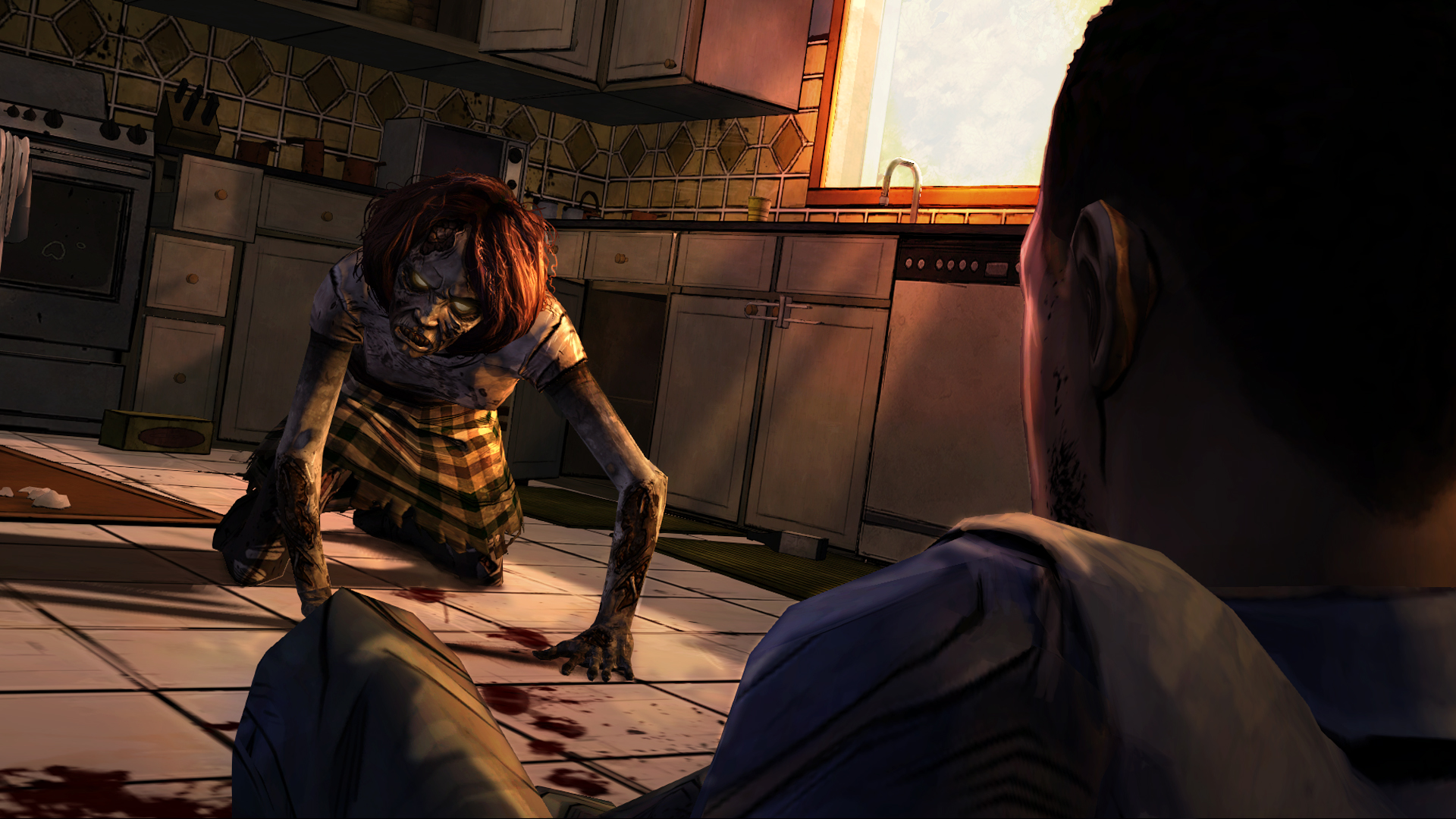(This post is going to be a bit different than my previous ones. This isn't so much a specific moment from a game as it is a short article about my impressions after having time with The Walking Dead game. Enjoy.)
A news
reporter, a farmer, and a tech nerd walk into a drug store. They are each completely different people
with dreams, motives, and unique stories, yet they all share the same fate: you
are the architect of their future. There
is a good chance that someone will not make it out alive, but how do you decide
who lives and who dies? Is there even a
fair way to make that kind of decision or do you just decide on a passing
whim? People will hate you; grudges will
be held, but in the end you cannot dwell on the dead, because they are the ones
trying to kill you and time is not a luxury that they will allow. This is the world of Telltale Games’ The
Walking Dead, and it is a world of despair and harsh consequence.
 |
| This looks deceivingly peaceful. |
By now
if you do not know what the world of The Walking Dead is then you have probably
been living under a rock. For you rock
dwelling folk, Robert Kirkman’s The Walking Dead is a critically acclaimed
graphic novel set during the zombie apocalypse.
If the comic was not already enough, it also became a hit TV show that
continues to set basic cable viewing records with each new season. To put it simply, the Walking Dead is a huge
deal. Telltale Games had some very big
shoes to fill coming into this project and I am delighted to say that they have
done a pretty astounding job.
 |
| Some characters from the comics make appearances like Glenn here. |
The
game sets you in the shoes of Lee Everett, a university professor turned
convicted killer. At the start of the
game, Lee finds himself in the back of a police car being driven to
prison. It isn’t long before all hell
breaks loose as the car hits a walker (term for roaming zombie) and careens off
the road. Injured and confused, Lee
crosses paths with a cute first grader named Clementine who manages to save his
life. Indebted to her, Lee and
Clementine band together and venture off to find more survivors while
protecting each other along the way.
 |
| The relationship between these two will be the core of the whole game. |
I need
to make one thing drastically clear: this is not a traditional adventure game
or even a traditional video game for that matter. The game is more of an interactive
movie. You won’t be fighting off hordes
of zombies or solving intricate puzzles.
What you will be doing is largely talking with gruesome zombie murder
peppered here and there to break things up.
The conversations are the true heart and soul of the game. Each conversation brings with it a quick time
event giving you four different responses.
Whichever response you choose is final and people remember and react based
on your decisions. Whether it is siding
with someone in an argument or lying about your true identity, your choices
shape the world around you.
 |
| One of the more grisly yet heartfelt moments in the first episode. |
The
conversations are wonderfully acted and strongly emotional making this one of
the most personal games I have ever played.
The Lee that I created through my choices is a caring yet no bullshit
individual. He is governed by realism
and a desire to protect those around him.
I will start a fight to save a friend’s child one minute and allow a
bitten woman to use my gun for suicide in the next. These are not easy choices, but these are
ones that I could see myself making in real life. This Lee is me, and the attachment that I
already have for him through one episode speaks volumes for the astounding job
Telltale has done on the dialog for the game.
 |
| Choose your words wisely. |
There
are only a few things in the game that stood out as slightly off and most of
them have to do with animation. The
comic book style of the game is beautifully fitting. Hard lines accent the characters giving the
art the same feel I get when I read the comic, but the look isn’t perfect. What bothered me most were some of the facial
animations. For example, there were
multiple occasions during my talks with Clementine that I found the positioning
of her eyes to make her look slightly possessed. She looked like her eyes had rolled into the
back of her head. It completely undercut
the conversation taking place between us.
In a game that heavily relies on the conversations, facial animations
cannot be distracting during these moments.
There are also moments where animations will glitch or lip syncing will
falter. This doesn’t ruin the game by
any means, but at times it can be bothersome.
 |
| Clementine's babysitter has seen better days. |
At the
end of the two hours that it took to complete the first episode, I was itching
to continue Lee and Clementine’s story.
Telltale has crafted an incredibly faithful adaptation of Kirkman’s
comic in both style and tone. The first
episode taught me many valuable lessons.
I cannot save two people; old men are ass holes; Clementine is friggin’
adorable; and, most importantly, fear the dead.
Going into the second episode, I am ready for the game to teach me the
greatest lesson of the comics: sometimes the living are worse than the dead.
No comments:
Post a Comment